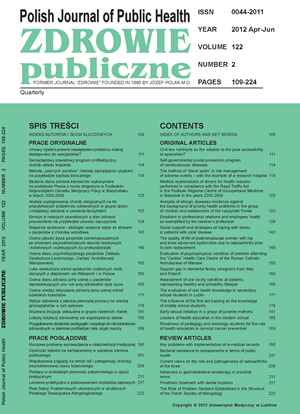Readiness of pedagogy and sociology students for the role of health educators in cervical cancer prevention
Keywords:
uterine cervix cancer, prevention, screening, health educationAbstract
Introduction. Cervical cancer prevention program may be efficient only when cytological screening covers most women from a target population. Achieving this goal requires involvement of other than healthcare workers professionals being properly prepared for participation in health education, such as pedagogics, sociologists and social workers. These professionals could serve as an additional non-medical component of health education chain and therefore improve the effectiveness of population-based prevention programs.
Aim. The aim of this study was to assess if pedagogy and sociology students have sufficient knowledge pertaining to cervical cancer prevention, enabling their future work as health educators to motivate women to participate in prevention programs.
Material and methods. This questionnaire survey included 284 female students of pedagogy and sociology from two university schools in Szczecin. Survey questions referred to their knowledge on epidemiology, pathogenesis, prognosis, symptoms and prevention of cervical cancer.
Results. This study revealed that half of the students had moderate knowledge on cervical cancer. A high level of knowledge was observed in one-third of the participants.
Conclusion. Students of pedagogy and sociology, whose curricula included health sociology and health prevention courses, exhibited acceptable level of knowledge required to take a role as health educators in cervical cancer prevention. However, potential health educators should be educated on cervical cancer prevention in a more systematized manner.
References
1. Miles A, Cockburn J, Smith RA, et al. A perspective from countries using organized screening programs. Cancer. 2004;101(suppl.5):1201-13.
2. Spaczyński M, Karowicz-Bilińska A, Rokita W, et al. Uczestnictwo kobiet w Populacyjnym Programie Profilaktyki i Wczesnego Wykrywania Raka Szyjki Macicy w latach 2007-2009. Ginekol Pol. 2010;81:655-63.
3. Sasieni P, Adams J, Cuzick J. Benefit of cervical screening at different ages: evidence from the UK audit of screening histories. Br J Cancer. 2003;89:88-93.
4. Gök M, Heideman D, van Kemenade F, et al. HPV testing on self collected cervicovaginal lavage specimens as screening method for women who do not attend ervical screening: cohort study. BMJ. 2010;340:1040- 48.
5. Blomberg K, Temestedt B-M, Tömberg S, et al. How do women who choose not to participate in population-based cervical cancer screening reason about their decision? Psychooncology. 2008;17:561-9.
6. Knops–Dullens T, de Vries N, de Vries H. Reasons for non-attendance in cervical cancer screening programmes: an application of the Integrated Model for Behavioural Change. Eur J Cancer Prev. 2007;16:436-45.
7. Ackerson K, Preston S. A decision theory perspective on why women do or do not decide to have cancer screening: systematic review. J Adv Nurs. 2009:65;1130-40.
8. Tacken M, Braspenning J, Hemens R, et al. Uptake of cervical cancer screening in The Netherlands is mainly influenced by women’s beliefs about the screening and by the inviting organization. Eur J Publ Health. 2007;17:178-85.
9. Spaczyński M, Nowak-Markwitz E, Januszek-Michalecka L, et al. Profil socjalny kobiet a ich udział w Programie Profilaktyki i Wczesnego Wykrywania Raka Szyjki Macicy w Polsce. Ginekol Pol. 2009;80:833-8.
10. Twinn S, Shiu A, Holroyd E. Women’s knowledge about cervical cancer and cervical screening practice: a pilot study of Hong Kong Chinese women. Cancer Nurs. 2002;25:377-84.
11. Ackermann S, Renner SP, Fasching PA, et al. Awareness of general and personal risk factors for uterine cancer among healthy women. Eur J Cancer Prev. 2005;14:519-24. 12. Walsh JC. The impact of knowledge, perceived barriers and perception of risk on attendance for a routine cervical smear. Eur J Contracept Reprod Health Care. 2006;11:291-6.
13. Stein K, Lewendon G, Jenkins R, et al. Improving uptake of cervical cancer screening in women with prolonged history of non-attendance for screening: a randomized trial of enhanced invitation methods. J Med Screen. 2005;12:185-9.
14. Spadea T, Bellini S, Kunst A, et al. The impact of interventions to improve attendance in female cancer screening among lower socioeconomic groups: A review. Prev Med. 2010;50:159-64.
15. Nowicki A, Borowa I, Maruszak M. Zachowania zdrowotne kobiet w zakresie zapobiegania, wczesnego wykrywania stanów przedrakowych i raka szyjki macicy. Ginekol Pol. 2008;79:840-9.


